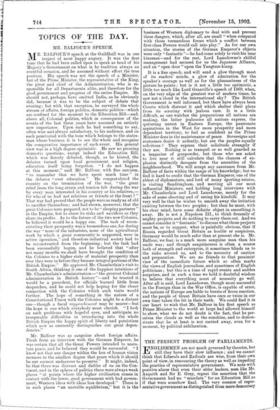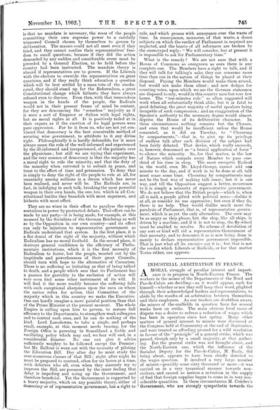THE PRESENT PROBLEM OF PARLIAMENTS. E NGLISHMEN are not much governed
by theories, but still they have their slow influence ; and we cannot think that Liberals and Radicals are wise, from their own point of view, in renouncing the theory as well as impeding the practice of representative government. We note with positive alarm that even their abler leaders, men like Mr. Asquith and Sir E. Grey, repeat the assertion that the Government had no " mandate " for an Education Bill as if that were somehow final. The very essence of repre- sentative government as distinguished from mere democracy is.that no mandate is necessary, the mass of the people committing their own • supreme power to a carefully winnowed Council chosen by themselves to govern by deliberation. The masses could not all meet even if they tried; and they cannot confine their representatives' free- dom to small questions, because if they did the action demanded by any sudden and considerable event must be preceded by a General Election, to •be held before the country had. been instructed. The mandate theory is absurd if representatives are to govern. If the Liberals wish the electors to override the representatives on great questions, and if they really think education a, question which will be best settled by a mass vote of the unedu- cated, they should stand up for the Referendum, a great Constitutional change which hitherto they have always refused even to discuss. Even then, with that tremendous weapon in the bands of the people, the Radicals would not in their present frame of mind be content, for they are denouncing the " senseless " majority as if it were a sort of Emperor or Sultan with legal rights, but no moral rights at all. It is positively railed at in their organs as if the exertion of its legal powers were pure oppression. Far be it from us, who are not yet con- vinced that democracy is the best conceivable method of security,° wise government, to attribute to it any divine right. Philosophically it is hardly defensible, for it must always mean the rule of the well-informed and experienced by the ill-informed and inexperienced, of the patients over the physicians ; but still we are trying that experiment, and the very essence of democracy is that the majority has a moral right to rule the minority, and that the duty of the minority when outvoted is to submit in peace, and trust to the effect of time and persuasion. To deny that is simply to deny the right of the people to rule at all, for unanimity among millions is a dream which has never been realised, and never will be. The Radicals are, in fact, in indulging in such talk, breaking the most powerful weapon in their own hands, the one, too, which in all Con- stitutional battles they brandish with most eagerness, and hitherto with most effect.
They are no wiser in their effort to paralyse the repre- sentatives in power by protracted debate. That effort can be made by any party—it is being made, for example, at this moment by the Socialists of the German Reichstag as well as by the Opposition in our own country—and its effect can only be injurious to representative government as Radicals understand that system. In the first place, it is a flat denial of the right of the majority, without which Radicalism has no moral foothold. In the second place, it destroys general confidence in the efficiency of Parlia- mentary institutions, which it is the first necessity of Radicalism to foster, lest the people, wearied out by the ineptitude and powerlessness of their great Councils, should turn with hope to the alternative of Ca,esarism. There is no suffering so irritating as that of being talked to death, and a people which sees that its Parliament has a passion for garrulity to the exclusion of action will very soon find some other instrument of its will. It will find it the more readily because the suffering falls with such exceptional sharpness upon the men on whom the nation relies for action, that Committee of the majority which in this country we make the Executive. One can hardly imagine a more painful position than that of the Prime Minister at the present moment. The whole Empire is callinc, upon him to govern, to restore full efficiency to the Departments, to strengthen weak colleagues and to control rash ones, and he can do nothing of the kind. Lord Lansdowne, to take a single, and perhaps small, example, at this moment needs bracing, for the Foreign Office is pursuing in Somaliland a feeble and vacillating policy which may end, we fear will end, iu a considerable disaster. No one can give it advice sufficiently weighty to be followed except the Premier ; but Mr. Balfour is worn out with the necessity of piloting the Education Bill. Dav after day he must study the over-numerous clauses of that Bill ; night after night he must be prepared to contend, often for six hours at a time, with debaters who all, even when they sincerely try to improve the Bill, are possessed by the inner feeling that delay is impeding and using up the Government, and therefore beneficial. Yet the Government is supported by a heavy majority, which on any possible theory, either of democracy or of representative government, has a right to rule, and which groans with annoyance over the waste of time. In consequence, moreover, of that waste, a dozen subjects on which the verdict of Parliament is required are neglected, and the hearts of all reformers are broken by the stereotyped reply: " We will consider, but at present it is impossible to ask for Parliamentary time."
What is the remedy ? We are not sure that with a House of Commons so overgrown as ours there is any complete one. The Members have a right to talk, and if they will talk for talking's sake, they can consume more time than can in the nature of things be placed at their disposal. Paying the Members would make them attend, but would not make them silent ; and new dodges for counting votes, upon which we see the German statesmen are disposed to rely, would in this country save but very few hours. The "ten-minutes rule" so often suggested will work when all substantially think alike, but it is fatal to good debating, the great majority of useful speakers being incapable of such compression ; and an exaggeration of the Speaker's authority to the necessary degree would almost deprive the House of its deliberative character. In these circumstances nothing remains but the Closure, and even that would be insufficient unless the House consented, as it did on Tuesday, to "Closuring by compartments,"—that is, to give up its privilege of endless talk after each division of the subject had been fairly debated. That device, which really succeeds, is, however, denounced as " a brutal application of force " to silence the minority. So, for that matter, is the law of Nature which compels every Member to pass one- third of his time in sleep. The most energetic Radical in the world, even Mr. Lloyd-George, cannot add one minute to the day, and if work is to be done at all, talk must cease some time. Closuring by compartments may not be the best way of making talk cease ; but it is one way, and till the Opposition suggest a better, recurrence to it is simply a necessity of representative government. We do not believe that the British people—which is, when all is said, a people gifted with political sense—dislike it at all, or consider its use oppressive ; but even if they do, there is no help. They would dislike much more the paralysis of Parliament, that is, of representative govern- ment, which is as yet the only alternative. The crew may be as angry as they please, but the ship, like all ships, is driven by a machine, and if it is not to stop, the fly-wheel must be enabled to revolve. No scheme of devolution of any sort or kind will rid a representative Government of that necessity, and to denounce it as is now being done is merely to declare representative government impossible. That is just what all its enemies say it is ; but that is not the verdict which Liberals or Radicals, or for that matter Tories either, can approve.























































 Previous page
Previous page